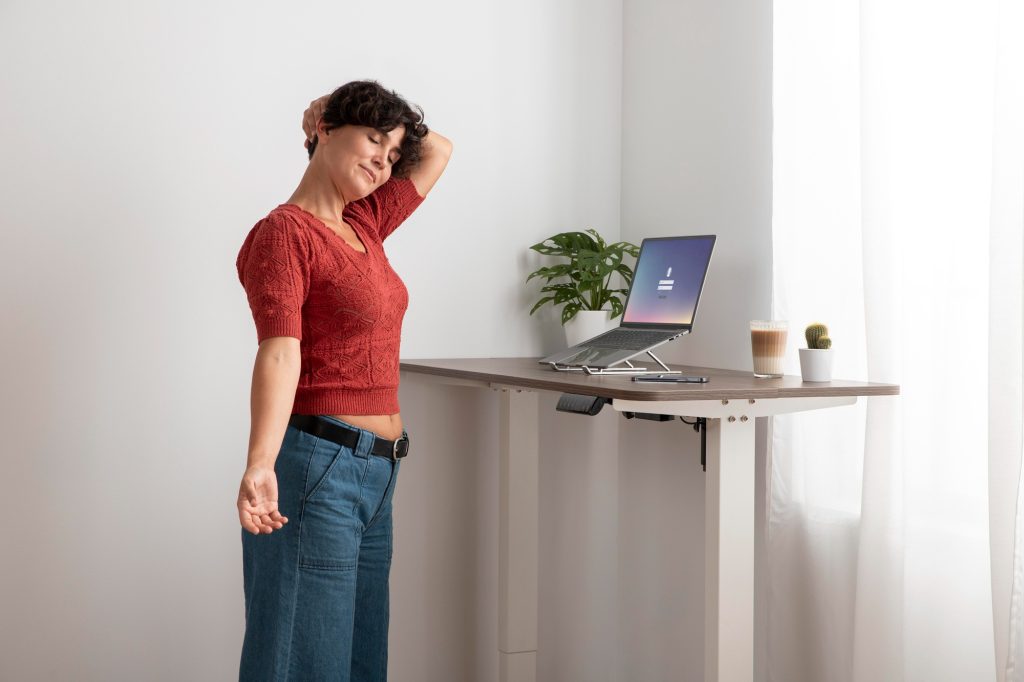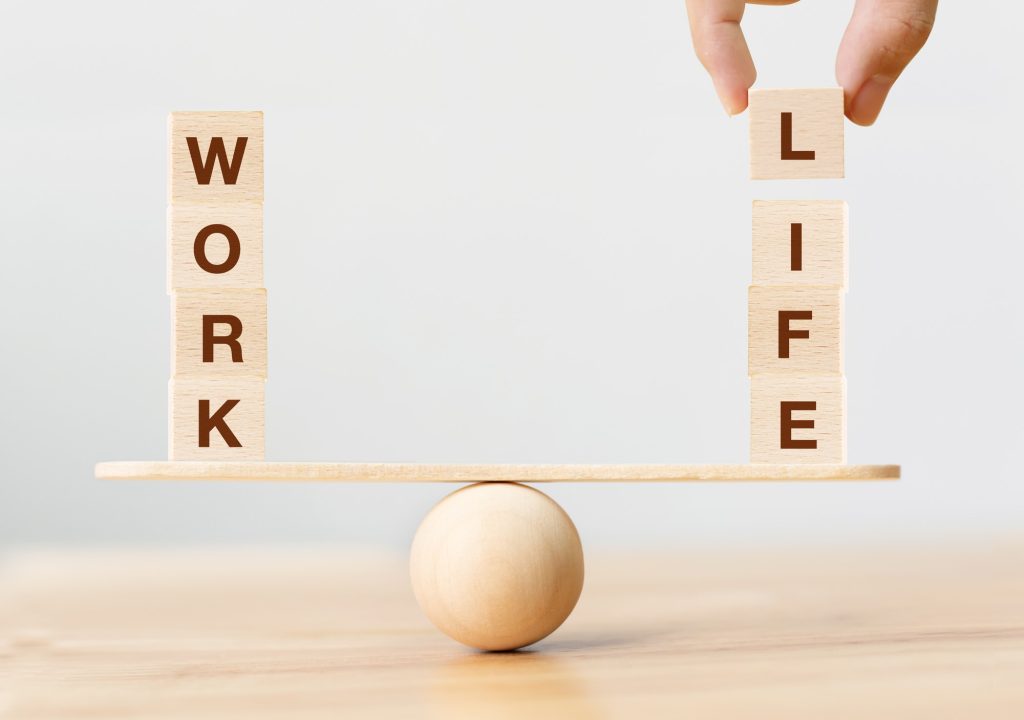The Definition of Health
How exactly can one define health? There are a variety of definitions. The World Health Organization (WHO) defines health as “a state of complete physical, mental and social well-being and not merely the absence of disease or infirmity”. Health is thus a comprehensive construct that refers not only to physical integrity but also to psychological well-being. WHO also states that health is a “fundamental right of every human being without distinction of race, religion, political belief, economic or social condition.” It is therefore a good that everyone can and should have.
Buddha is credited with the phrase: “Every human being is the author of his own health or disease”. And there is definitely a grain of truth in this quote, because everyone can do something for their own health and well-being. Managers and companies can also create health-promoting conditions in which employees experience less stress.
First, let’s look at what you can do to manage workloads well.
Take It Easy on Your Eyes in the Office and Home Office
Computer work can be hard on your eyes, but many people are unaware. Looking at a computer screen for hours every day, not to mention looking at your cell phone during breaks, is hard on your eyes. When we look at the screen so much, we get the so-called “office eye” problem: We focus our gaze on a small area, our eyes remain fixed, and we blink too infrequently. This dries out the tear film—with some unpleasant consequences: Eye inflammation, blurred vision, headaches, back or neck pain or in the worst case even myopia. Dry eyes due to prolonged screen time should be taken seriously! Two tips can help you manage your dry eyes: ventilation and breaks.

Ventilation is important, because dry room air is harmful to dry eyes. For example, if the air is particularly dry, keep a small bowl of water on the radiator or, if you work at home, keep a clothes rack of wet clothes in the office.
It is also helpful to take regular breaks to give your eyes a rest as well as an opportunity to relax. Close your eyes for 20 seconds between tasks, think of wide landscapes (as a counter-impulse to working on the computer), and maybe even put a wet towel over your eyes.
Why Healthy Food Is Important

Recent reports show that obesity is one of the greatest health challenges of the 21st century worldwide. Many individuals engage in too little exercise and unhealthy eating patterns, which is frequently attributed to time constraints at work. That’s why it’s important to eat healthy and incorporate enough exercise during the workday, too. But what exactly is a healthy diet? A healthy diet includes a varied diet with plenty of fresh vegetables, fruit and grains, preferably whole grain. It should also include legumes, meat and/or fish for protein, and plenty of fresh herbs. This varied diet will help you maintain a healthy weight and strengthen your metabolism, immune system and body. This will ensure that your body is optimally supplied with various nutrients, such as vitamins, minerals and trace elements.
To make sure you eat well at work, it’s a good idea to prepare your food the day before. For breakfast, try a healthy breakfast bowl with fresh fruit and oatmeal; for lunch, a salad with goat cheese and walnuts; and for a snack, an apple and a hearty nut mix. Whole wheat bread with egg and cottage cheese is also a great way to start the day, perhaps followed by a lentil and chickpea curry for lunch and some dried fruit for an afternoon snack. Those who bring their own food avoid unhealthy alternatives, such as eating a whole bar of chocolate in the morning because there’s nothing else for breakfast, or eating pasta in the cafeteria at lunchtime, which naturally leads to a big crash in the afternoon. This is not at all about banning certain foods altogether. Healthy eating is about balance: There’s nothing wrong with a piece of chocolate in the afternoon, or a slice of pizza if you want to celebrate the end of the day as a team.
And don’t forget to drink. Two to three liters of water, unsweetened herbal tea or fruit tea per day is recommended. It’s best to keep your drink on your desk next to your PC. Just make sure you keep enough distance! That way you’ll always be reminded to take a sip.
Plan for Exercise and Relaxation—Even during Working Hour

According to a WHO report, lack of exercise is one of the biggest health risks. More than a quarter of all adults worldwide move too little, in the USA, it is 40 percent! This can have serious consequences, such as cardiovascular diseases, diabetes or joint disorders. A shortened life expectancy can also be the result. That’s why exercise is so important—and why you should incorporate it into your office routine. There are many ways to do this, such as taking the stairs instead of the elevator, walking or biking to work, working in a home office at a height-adjustable desk, or even scheduling walking meetings instead of sitting meetings into your workday. You may have other ideas—just think about what you can do to make your workday as active as possible. An active break is also a good idea. You could take a walk around the block alone or with colleagues, do a round of yoga in your home office or go for a thirty-minute jog. You might also want to do some simple back exercises during your break to help prevent back pain caused by one-sided posture at your desk.
However, if you have a very active daily routine, for example because you work in childcare or nursing, something different applies to you. Make your breaks quiet and relaxed, and allow your body to rest. But even if you have an active job, back exercises and yoga—moderate, supportive movements—can help improve your posture and strengthen your back muscles.
Balancing Work and Family
To stay healthy in the long term, a good work-life balance is also particularly important. Work-life balance is the ideal state in which professional and private life are in harmony. It is therefore desirable that you as an employee, manage to combine your private life, i.e., your hobbies, friendships and family with your job. This can sometimes be very stressful, especially when things are stressful at work and you feel like you’re missing out on your free time.

To help you focus on your free time at the end of the day and stop thinking about unfinished work tasks, try these tips:
- Establish an after-work ritual This will help you recognize the line between work and play, and help you disconnect from your job. For example, you could go for a jog, reflect briefly on the workday and your accomplishments, or read a book quietly for 30 minutes.
- Set firm “free time” appointments During working hours, there are constant deadlines to meet. However, you can also use this concept in your spare time: Make plans with friends to go to coffee or the movies, join a regular exercise class, or set up a date night with your partner. That way, you’re more likely to make the most of your free time and not just curl up on the couch in the evening.
- Remember, it’s okay if work gets left behind Not everything always has to be done right away, sometimes there are just too many tasks for one day. And that’s okay. You don’t have to feel ashamed or guilty. After all, tomorrow is another day! At the end of the day, just write down your to-dos for the next day. True to the idea— write it down to get it out of your head! 😉That way, you get those “troublemakers” out of your head and you know immediately what to start on the next day.

Take a look at our e-training on stress management. You will get a lot of helpful input on how to deal with stress—during work and at the end of the day.
Healthy Leadership—Staff-Care and Self-Care
In order to maintain a healthy workplace, it is not only employees who need to be health conscious, but also managers. Through their leadership and position, managers can influence the health behaviors of their employees. Managers’ awareness of employee health and the resulting actions are referred to as staff-care. Managers can create conditions in which employees pay attention to their own well-being. They can achieve this, for example, by making a conscious effort to ensure that their employees reduce overtime as quickly as possible or do not build up too much in the first place. You can actively offer mediation in serious team conflicts to restore a better, healthier working atmosphere, or offer yourself as a reliable contact person in difficult situations.
However, it is also important for managers to take care of their own health—the keyword here is self-care. Managers often experience particularly high levels of stress and psychological strain, for example, from interactions with their own supervisors, disagreements with employees, or frequent work interruptions. These multiple stresses can also affect a leader’s mood and leadership behavior. And leadership behavior has a significant influence on the health of employees—both positively and negatively.
So you see, managers and employees alike should be aware of what health means and actively work to maintain it in the long term. If you would like to learn more about the exciting topic of health in the workplace, take a look at our e-training course on staying fit and active on the job.

